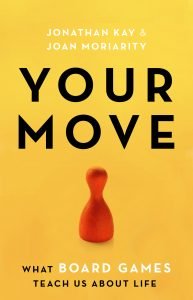Endorsed by Harvard professor and Enlightenment Now author Steven Pinker (“a lively and insightful book — games are not just fun and games: they allow us to explore the complexities of the world”) and Kirkus Reviews (“perceptive and intriguing“), Your Move is as likely to appeal to readers with a passing interest in board games as it is to diehard players.
Board games are among our most ancient and beloved art forms. During the rise of digital media, they fell from prominence for a decade or two, but today they are in a new golden age: ingeniously designed, beautiful to look at, and exhilarating to play.
But tabletop games — which by nature demand active engagement from their audience — have a great deal more to offer us than mere entertainment value, social activity, or intellectual exercise.

In Your Move, co-authors Jonathan Kay and Joan Moriarity tackle headline-making subjects from Trump’s America to cultural appropriation, transgender identity to economic decision-making, political correctness to Alpha personalities, and more by examining board games — which, they argue, reveal far more about our values, histories, fears, politics, relationships, and identities than TV, movies or music ever could.
Among the topics explored are:
-
The recent board game resurgence: why are people returning in droves to this analog pastime?
-
What board games can tell us about social justice, colonialism, bigotry, capitalism, and other hot button issues dominating the news
-
How tabletop games reveal more about a player’s personality than they realize
-
The power of playfulness, the stigma surrounding play, and the irrational fear that many people have toward playing a game with their friends for fun
-
Challenging assumptions about the demographic that gravitates to the famously offensive Cards Against Humanity
-
Why games are especially effective teachers of tricky subjects like history, economics, negotiation, and statistical probability
-
Role-playing, fantasy, and identity: how board games helped Moriarity to become comfortable expressing herself as a trans woman in the real world, as she recently wrote about in the Washington Post
-
Cultural appropriation in the world of tabletop gaming: how a board game called ‘Greenland’ gave Kay greater context, understanding, and respect for the history of the Indigenous societies of North America and Europe than he was ever able to glean from his time in a classroom
-
Their relationship as players and co-authors, and how games have helped two people who are far apart on the political spectrum to find abundant common ground



